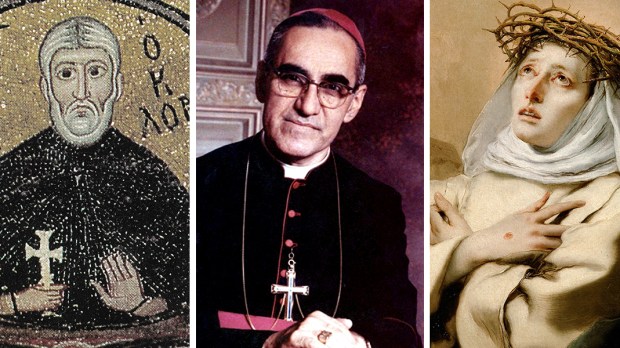The internet can be a tool for great good, but it’s also a perilous place for souls, offering temptations to lust and greed, to the use of dehumanizing rhetoric and an embrace of dangerous ideologies. And while Blessed Carlo Acutis and his website detailing Eucharistic miracles can show us the power of online evangelization, there are as yet very few saints who had access to the internet. Still, virtue is virtue regardless of the arena where it’s practiced, and saints can offer us insight into how to pursue holiness online even if they lived long before the advent of the internet.
When it’s best not to read the replies
St. John Colobus (339-405) was a monk in the Egyptian desert, most famous for the virtue of obedience. Having been told to walk 10 miles to the river each day in order to water a walking stick planted in the ground, John obeyed; after several years, the stick flowered and bore fruit.
Other than supernatural obedience, John is most famous for running away from people who were teasing him or who were arguing with each other. John worried that enduring people’s abuse would cause him to lose his temper, so he fled. He worried that hearing other people harass each other would fill his mind with ugliness, so he ran away even when the argument had nothing to do with him.
Many of us could stand to do the same online.
When falsehood needs to be corrected with charity
St. Catherine of Siena (1347-1380) is well known for her work to correct the pope and persuade him to move from France back to Rome. What many who invoke the Italian lay Dominican often forget, however, is the absolute gentleness and humility with which she wrote, speaking uncompromising truth but couching it in tender, loving, respectful language.
She addressed the pope as “Most holy and dear and sweet father in Christ,” but also warned, “I, if I were in your place, should fear lest divine judgment come upon me.” She called the notoriously depraved queen of Naples “Dearest mother in Christ sweet Jesus,” then went on to plead, “No more thus for the love of Christ crucified! You are in every way calling down the divine judgment. I grieve for it.”
Catherine spoke the truth with deepest concern for the hearts and souls of those she addressed and with no regard at all for her own reputation.
What would our social media presence look like if we did the same?
When you’re trying to maintain a friendship with someone you disagree with
St. Oscar Romero (1917-1980) and Ven. Rutilio Grande (1928-1977) were an unlikely pair of friends. Though a diocesan priest, Romero lived with Grande’s Jesuit community in San Salvador for a few years. Though famously standoffish at the time, Romero and Grande got along very well, despite their political and liturgical differences.
Grande had progressive preferences in liturgy while Romero was much more traditional. Grande was very politically involved, fighting for the rights of the poor, while Romero was content (for the time) to ignore the abuses of the right-wing government. Still, the two were so close that when Romero was appointed auxiliary bishop, he asked Grande to help him plan the liturgy. Though they were on opposite ends of the political spectrum, they remained close until Grande’s assassination; it was looking at the dead body of his friend that transformed Romero from a timid and bookish man to the warrior for justice that we know so well.
But this conversion was rooted in friendship, possible only because Romero and Grande had been able to love each other well in spite of their differences.
When you want to use beauty to lead people to the truth
Servant of God Antonio Cuipa (d. 1704) was a leader in his Appalachee community, second-in-command over thousands of Native Christians. He was a husband and father of two, a hard-working carpenter, a flautist, and an evangelist.
As an evangelist, Antonio would approach non-Christian villages and play his flute. When the people were suitably impressed, he would offer them wooden flutes he had carved himself. Only then would he begin to preach the Gospel, starting at places of commonality between Christians and those who followed traditional Native spiritual practices. Antonio was ultimately martyred, after having used beauty to bring many, many souls to Christ.
When you need to repent of a toxic ideology
Bl. Teresio Olivelli (1916-1945) was a Fascist. He wasn’t a horrible villain who had a change of heart. He was a man of prayer who (wrongly) believed that the Fascist party would fight communism and protect Christian interests. Teresio worked for the National Institute of Fascist Culture and won a prize for an essay that tried to harmonize Fascist racism with Catholic doctrine. Though he resisted some of the worst errors of Fascism, Teresio was convinced that it had great potential and sought to affect the party from within, even joining the Italian army and fighting alongside Germany in a campaign that left two thirds of his division dead.
But Teresio loved God more than he loved his party, and he began to see the evils of Fascism. Eventually, he refused to cooperate with Nazis and was imprisoned. After escaping, he became a member of the resistance, founding a newspaper called The Rebel and working against Nazism and Fascism until he was arrested, sent to a concentration camp, and finally beaten to death at 29.
Bl. Teresio Olivelli knows what it is to run after Jesus and miss the mark grievously. He also knows that nobody is too far gone for grace, that whatever ideology you’ve made into your god, there is always hope for those who love God (however poorly).


